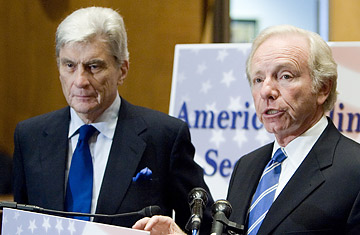
Senator Joseph Lieberman, right, and Senator John Warner hold a news conference in Washington, DC.
It's a truism in politics: support for environmental causes tends to be broad, but shallow. Broad, because most voters support political action to protect the Earth, and not even the most conservative of politicians want to be seen as standing against it. Shallow, because few Americans really allow environmental issues to dictate their votes — and politicians know it.
Global warming is a cause that has gradually broadened its support among the American public. Now we'll begin to see whether that support still runs shallow. On Monday the Senate will begin debating America's Climate Security Act, a bill that would finally attempt to make carbon-emission reduction a federal objective. Co-sponsored by Senators Joseph Lieberman and John Warner, the measure calls for reducing greenhouse gas emissions 18% below 2005 levels by 2020, and nearly 70% by 2050, using a cap-and-trade system that steadily reduces the amount of carbon that industry is allowed to emit on an annual basis. The bill has garnered solid support across the political spectrum — corporations like General Electric and environmental groups like Environmental Defense Fund (EDF) have both come out in favor of the act. "No bill is perfect, but we think this is a very strong framework," says Nathaniel Keohane, director of economic policy and analysis for EDF, which has launched a series of TV ads in favor of the bill. It's by far the most serious attempt by the federal government to reduce America's greenhouse gas emissions, a decade after Congress rejected the Kyoto Protocol.
It's also extremely unlikely to pass. More than a dozen key Senators, including several Democrats, have yet to announce whether they will back Warner-Lieberman, and Senate Majority Leader Harry Reid, who does support the bill, isn't pushing particularly hard. Some key Senators won't even make Monday's vote, including Republican presidential nominee John McCain, who is skipping the debate despite having made strong action on climate change a key part of his pitch to Independents. (Let's not single out McCain — reportedly Senators Barack Obama and Hillary Clinton may miss the vote as well.) The bill, as climate blogger Joseph Romm put it, is merely being moved from "morgue to anatomy class."
Even some energy corporations that favor cap and trade in general, like North Carolina's Duke Energy, are lobbying against the act, claiming it would hit coal-dependent utilities too hard. Some green groups like Friends of the Earth (FoE) also oppose it, arguing the bill's emission-reduction goals are too timid. They want to wait to pass legislation until 2009, when a new President and Congress will presumably be more open to a stronger measure. "It is a wholly inadequate response to the greatest environmental crisis of our time," said FoE president Brent Blackwelder.
Though that criticism may be overstated, there is a lot wrong with the Climate Security Act, an unwieldy 494-page bill that has been stuffed with handouts to various interest groups, including the nuclear industry. Initially permits worth hundreds of billions of dollars will be given out, free, to industrial greenhouse gas emitters, rather than auctioned off. The act also allows companies to meet part of their carbon caps using offsets, even as scientists increasingly question the effectiveness of such carbon trading. Both measures are likely to depress the price of carbon over the life of the bill. (The lower the real price of carbon, the less effective any cap-and-trade system will be in stimulating investment in low-carbon technology.) "I'm for the cap," says Peter Barnes, an entrepreneur and activist who supports a system that would auction off all permits and return the revenue to taxpayers. "But I'm not for what amounts to a massive wealth transfer from American families to private corporations."
It's that last argument — that cap and trade may place a financial burden on ordinary Americans — that may be the biggest sticking point for Warner-Lieberman or whatever comes after it. Conservative groups like the National Association of Manufacturers have released studies that claim the bill will ruin the American economy by raising the price of energy through the roof. But in reality, that scenario is unlikely — the balance of economic studies, including one by the Environmental Protection Agency, say the bill's economic cost will be manageable, and a raft of studies claim that the economic cost of doing nothing will be far higher. "It's not going to be free," says Keohane. "But the magnitude of the impact is very small."
Economic theory and political will, however, don't always go together. The dramatic rise in gasoline prices has caused widespread public anger, as every member of Congress who went home for the Memorial Day break is no doubt aware. Support for lowering energy prices is something that has both broad and deep support in America; it will drive voters to the ballot box. And although Warner-Lieberman, or any future cap-and-trade bill, is unlikely to hike the price of gasoline, it will surely be used as a convenient political scapegoat.
In a world of increasingly constrained fossil fuel supplies, the only way to achieve lower prices will be through new policy that promotes the development of alternative energy — like cap and trade. But figuring out how to assemble a political coalition that understands the argument and shows deep support for climate change action — that will be the real challenge, long after Warner-Lieberman has been sent to the legislative graveyard.
